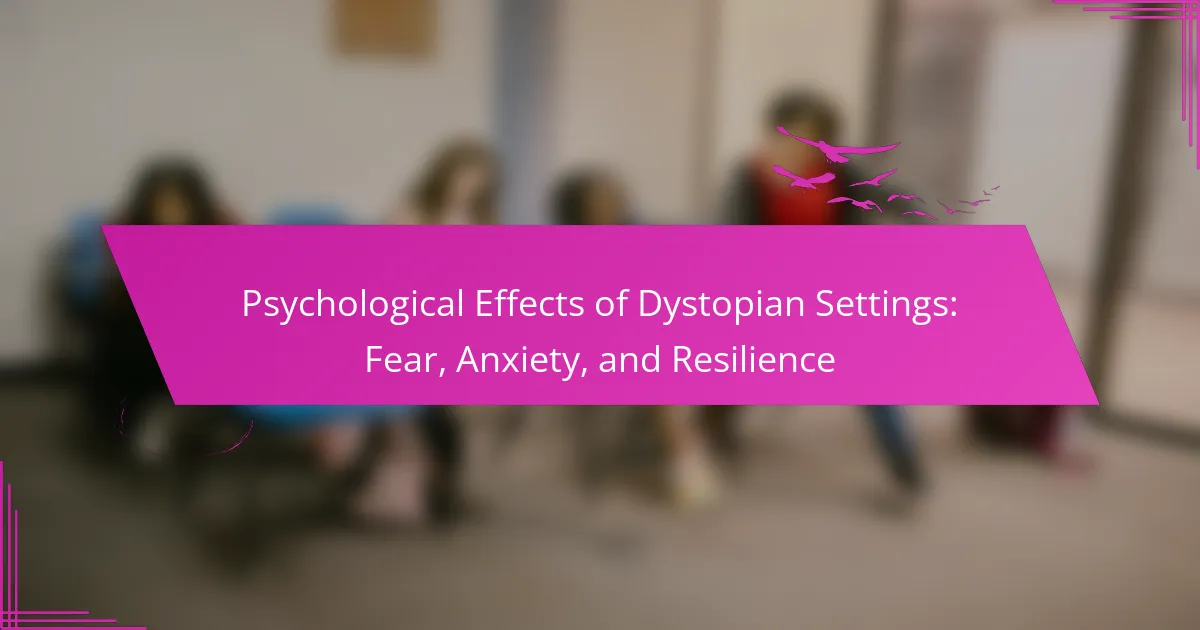Dystopian settings evoke profound psychological effects, primarily through fear, anxiety, and resilience. These narratives amplify feelings of helplessness and societal collapse, leading to heightened emotional distress. The interplay of these emotions shapes coping strategies, revealing human strength in adversity. Understanding these dynamics offers insight into how individuals process real-world challenges and cultivate resilience.
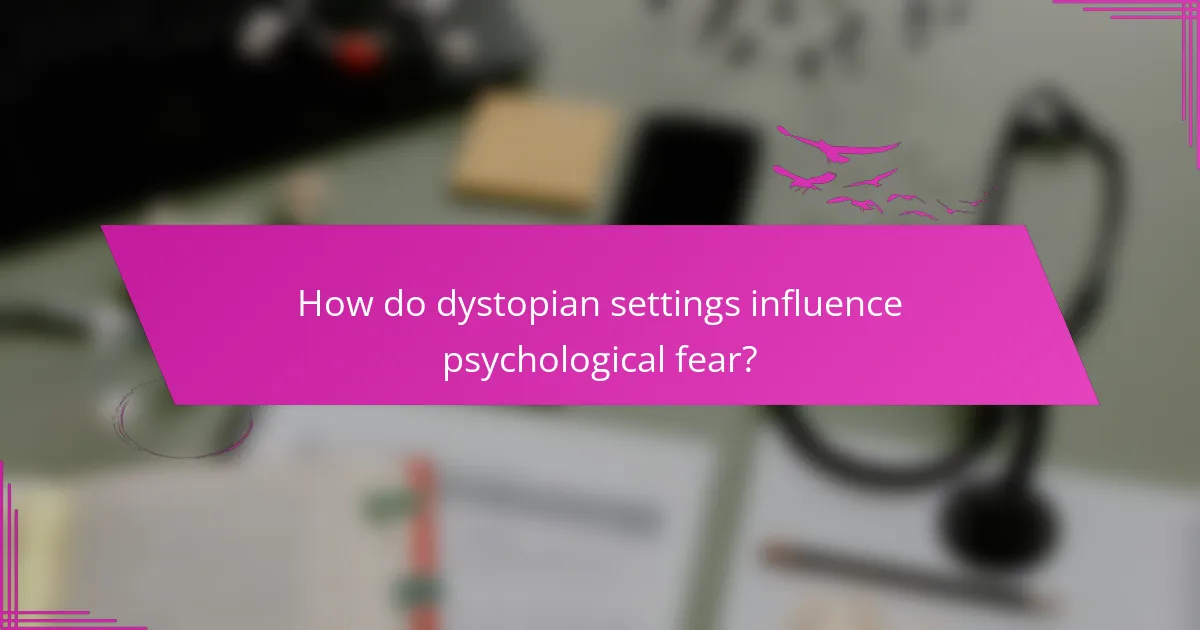
How do dystopian settings influence psychological fear?
Dystopian settings significantly amplify psychological fear by portraying extreme scenarios that challenge human values. These environments often evoke anxiety by highlighting societal collapse, loss of autonomy, and existential threats. As a result, individuals may experience heightened vigilance and emotional distress.
The portrayal of oppressive regimes in dystopian narratives enhances feelings of helplessness. Characters often face moral dilemmas that reflect real-world issues, deepening the viewer’s connection to the fear. This unique attribute of relatability makes the psychological impact more profound.
Moreover, resilience emerges as a rare attribute in these narratives. Characters frequently adapt to their grim realities, showcasing human strength in adversity. This aspect can inspire audiences, fostering a sense of hope despite the surrounding fear.
Ultimately, the interplay of fear and resilience in dystopian settings shapes psychological responses, making these narratives powerful tools for exploring human emotion.
What are the common psychological responses to fear in dystopian narratives?
Common psychological responses to fear in dystopian narratives include heightened anxiety, desensitization, and a drive for resilience. Individuals often experience increased vigilance and emotional distress, reflecting the oppressive environment. As a result, characters may develop coping mechanisms that demonstrate their adaptability. These responses highlight the interplay between fear and human resilience in challenging circumstances.
Which factors amplify fear in dystopian environments?
Fear in dystopian environments is amplified by factors such as loss of control, social isolation, and constant surveillance. These elements create a pervasive sense of vulnerability and helplessness. Psychological theories suggest that uncertainty intensifies anxiety, making individuals more susceptible to fear. Additionally, exposure to violence and oppressive regimes can lead to chronic stress, further exacerbating feelings of fear.
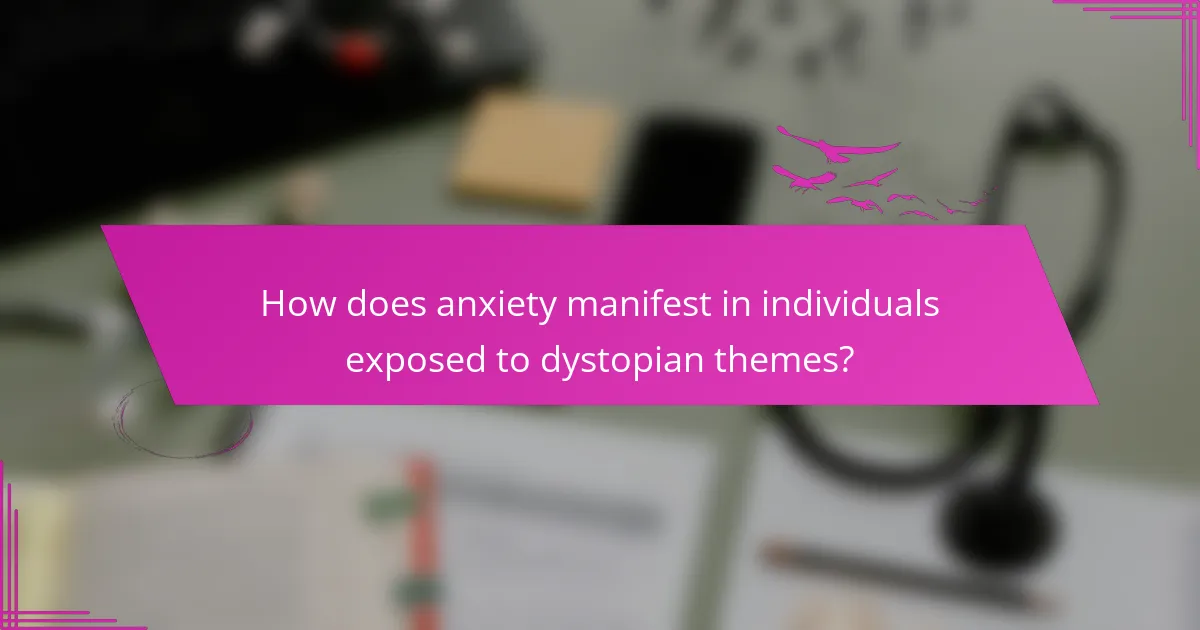
How does anxiety manifest in individuals exposed to dystopian themes?
Anxiety manifests in individuals exposed to dystopian themes through heightened fear, intrusive thoughts, and emotional distress. These psychological effects arise from the portrayal of societal collapse and existential threats. Studies show that exposure to dystopian narratives can trigger feelings of helplessness and uncertainty, leading to increased anxiety levels. Additionally, the unique attribute of these themes often elicits a sense of urgency, amplifying stress responses. As a result, individuals may exhibit avoidance behaviors and heightened sensitivity to perceived threats in their environments.
What role does uncertainty play in anxiety levels?
Uncertainty significantly heightens anxiety levels by creating a sense of unpredictability. In dystopian settings, this uncertainty is amplified, leading to increased fear and stress. Individuals may experience heightened vigilance and a constant state of worry about potential threats. The psychological impact can manifest in physical symptoms, such as increased heart rate and tension. Moreover, resilience can be tested as individuals navigate these uncertain environments, often requiring adaptive coping strategies to manage their anxiety.
How do cultural perceptions of dystopia affect anxiety responses?
Cultural perceptions of dystopia significantly influence anxiety responses. Different cultures interpret dystopian themes through their unique historical, social, and political lenses, shaping emotional reactions. For instance, societies with a history of oppression may experience heightened anxiety when faced with dystopian narratives, reflecting their fears of loss of freedom. Conversely, cultures that prioritize resilience may respond with critical thinking and a quest for solutions, reducing anxiety levels. This divergence highlights how cultural contexts can either amplify or mitigate psychological distress in response to dystopian settings.
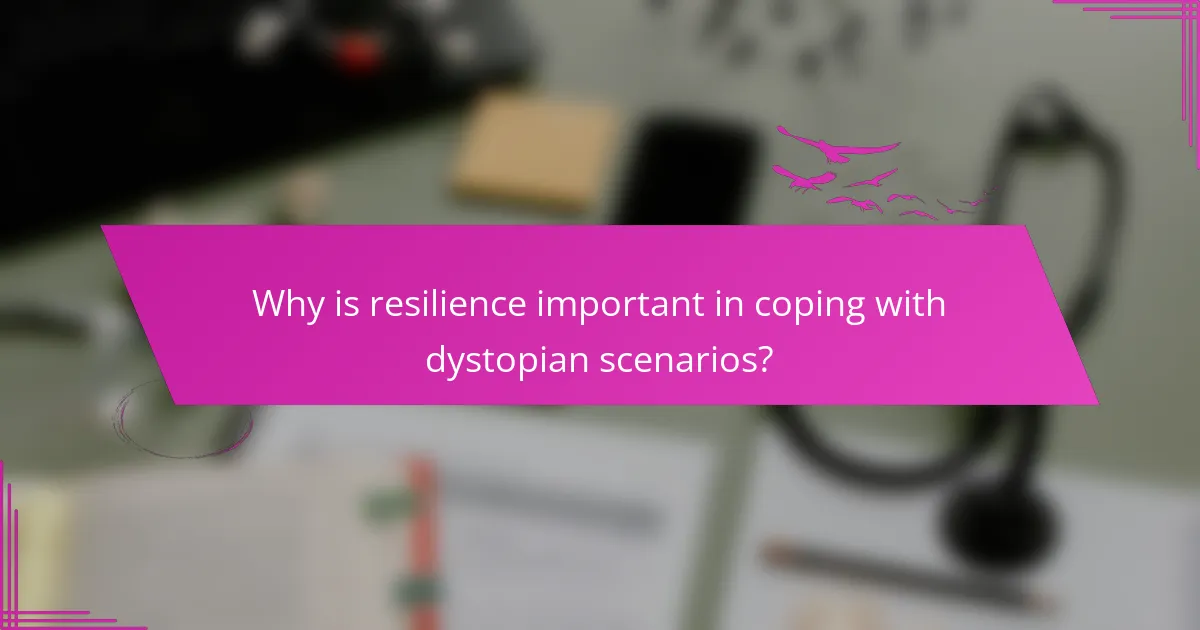
Why is resilience important in coping with dystopian scenarios?
Resilience is crucial for coping with dystopian scenarios as it enables individuals to adapt and thrive despite adversity. This psychological strength helps mitigate fear and anxiety, fostering a sense of control. Resilient individuals can develop effective coping strategies, which are essential in navigating chaotic environments. Studies show that resilience can reduce the impact of stress, enhancing mental well-being. As a result, cultivating resilience becomes a vital skill in facing the challenges posed by dystopian settings.
What strategies can enhance resilience in the face of dystopian fears?
Practicing mindfulness, fostering social connections, and developing problem-solving skills can enhance resilience against dystopian fears. Mindfulness techniques reduce anxiety by grounding individuals in the present. Social connections provide emotional support, helping individuals feel less isolated. Problem-solving skills empower individuals to navigate challenges effectively, reinforcing a sense of agency. Engaging in these strategies can mitigate the psychological effects of fear and anxiety associated with dystopian settings.
How do different demographics respond to resilience-building techniques?
Different demographics respond to resilience-building techniques based on cultural, social, and economic factors. For instance, younger individuals often utilize digital platforms for support, while older adults may rely on community engagement. Studies show that socioeconomic status influences access to resources, affecting resilience outcomes. Additionally, cultural backgrounds shape coping mechanisms, with collectivist societies emphasizing community strength over individual resilience. Understanding these variations helps tailor resilience strategies effectively across diverse populations.
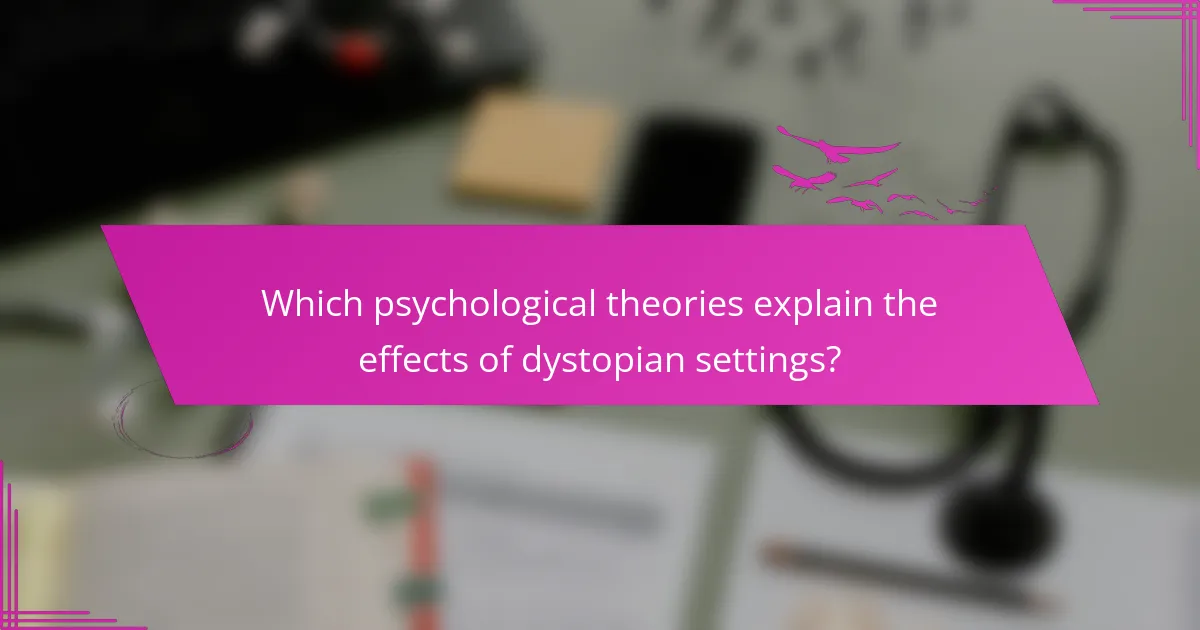
Which psychological theories explain the effects of dystopian settings?
Psychological theories explaining the effects of dystopian settings include existential psychology, cognitive dissonance theory, and social identity theory. These frameworks highlight how fear and anxiety arise from perceived threats and societal breakdowns. Existential psychology suggests that dystopian scenarios provoke anxiety about existence and meaning. Cognitive dissonance theory explains how conflicting beliefs in such settings lead to stress and discomfort. Social identity theory emphasizes the impact of group dynamics and belonging in oppressive environments, influencing resilience and coping strategies. Together, these theories illustrate the complex psychological landscape shaped by dystopian narratives.
How do cognitive theories interpret fear and anxiety in dystopian contexts?
Cognitive theories interpret fear and anxiety in dystopian contexts as responses to perceived threats and uncertainties. These theories emphasize how individuals process information about their environment, leading to heightened emotional reactions. For instance, the concept of cognitive appraisal suggests that individuals assess the severity of threats, which can amplify feelings of fear and anxiety.
In dystopian narratives, characters often face overwhelming odds, leading to a sense of helplessness. This scenario triggers maladaptive thought patterns, such as catastrophizing, which exacerbate anxiety levels. Research indicates that prolonged exposure to dystopian settings can affect mental resilience, causing individuals to develop coping mechanisms or, conversely, succumb to despair.
Moreover, cognitive dissonance may arise when individuals’ beliefs clash with the harsh realities of a dystopian world. This dissonance can lead to increased anxiety as individuals struggle to reconcile their values with their experiences. Understanding these cognitive processes is crucial for addressing mental health in dystopian contexts.
What role does existential psychology play in understanding resilience?
Existential psychology significantly enhances our understanding of resilience in dystopian settings. It emphasizes the importance of meaning-making in the face of fear and anxiety. Individuals often draw on personal values and beliefs to navigate distressing environments, fostering resilience. Research indicates that those who find purpose amid chaos exhibit stronger coping mechanisms. This highlights the role of existential thoughts in building psychological strength, allowing individuals to adapt and thrive despite adversity.
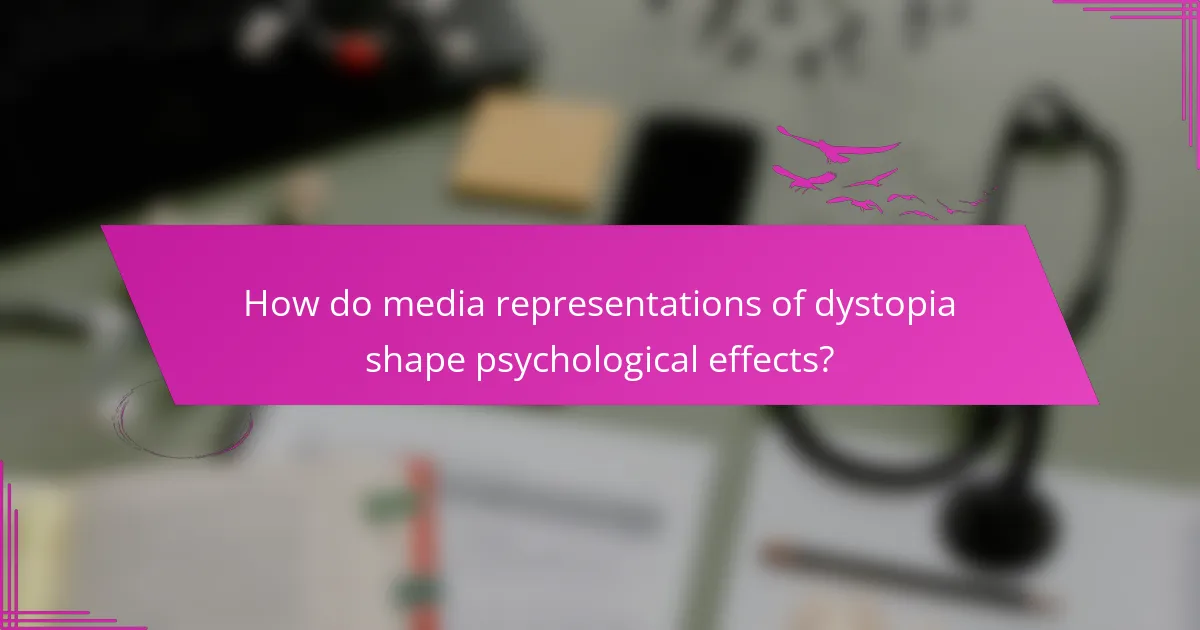
How do media representations of dystopia shape psychological effects?
Media representations of dystopia significantly influence psychological effects like fear, anxiety, and resilience. Dystopian narratives often evoke feelings of helplessness, amplifying anxiety about societal collapse. Characters facing extreme adversity inspire resilience in audiences, highlighting human strength. Studies show that exposure to dystopian themes can trigger stress responses, yet also foster a sense of community among viewers. This duality shapes how individuals process real-world challenges, cultivating a blend of fear and empowerment.
What are the implications of dystopian films on viewer anxiety?
Dystopian films significantly heighten viewer anxiety by exploring themes of societal collapse and existential threats. These narratives evoke fear and provoke emotional responses, often leading to increased anxiety in audiences.
Research indicates that exposure to dystopian settings can trigger feelings of helplessness, as viewers confront scenarios that reflect real-world issues like climate change and political instability. This can lead to a unique attribute of resilience, as some viewers may find motivation to engage in social change or personal growth after experiencing these films.
Additionally, the psychological impact varies among individuals. Some may experience rare attributes of desensitization, while others might develop a heightened awareness of societal issues. This complex interplay of fear, anxiety, and resilience illustrates the profound implications of dystopian films on the viewer’s mental state.
How do video games depicting dystopian worlds affect emotional responses?
Video games depicting dystopian worlds can evoke strong emotional responses, primarily fear and anxiety. These settings often immerse players in scenarios that challenge their moral beliefs and survival instincts, fostering a sense of resilience. Research indicates that engaging with such narratives can lead to increased emotional awareness and coping strategies. Players may experience heightened empathy for characters, influencing their real-world perspectives on societal issues. The unique attribute of these games is their ability to simulate extreme situations, allowing players to explore their emotional limits in a safe environment.
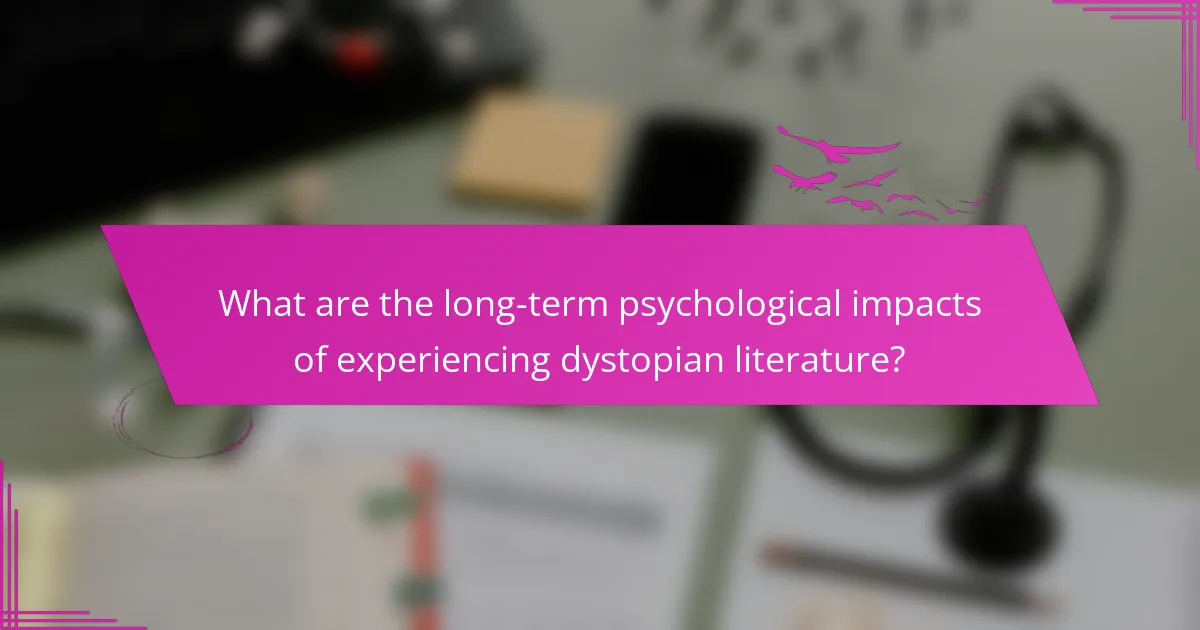
What are the long-term psychological impacts of experiencing dystopian literature?
Experiencing dystopian literature can lead to long-term psychological impacts, such as heightened fear, anxiety, and increased resilience. These narratives often evoke feelings of hopelessness and uncertainty, which can persist beyond the reading experience.
Research indicates that prolonged exposure to dystopian themes can create a sense of existential dread, affecting mental health. For example, readers may develop a chronic sense of anxiety regarding societal issues like climate change or authoritarianism.
Conversely, engaging with dystopian literature can foster resilience. Readers often find coping mechanisms through characters’ struggles, leading to a greater understanding of personal agency in challenging situations. This duality highlights the complex psychological landscape shaped by dystopian narratives.
Overall, the psychological effects of dystopian settings are multifaceted, influencing emotions and coping strategies in profound ways.
How does repeated exposure to dystopian themes influence mental health?
Repeated exposure to dystopian themes can heighten fear and anxiety while fostering resilience. Individuals may develop a heightened sensitivity to societal issues, leading to increased stress. This exposure can also cultivate coping mechanisms as people confront complex emotions and uncertainties. Research indicates that engaging with dystopian narratives may enhance critical thinking and awareness of real-world challenges. Over time, this can lead to a paradoxical effect where anxiety prompts proactive behaviors aimed at change.
What unique attributes can be found in dystopian literature that affect psychological outcomes?
Dystopian literature uniquely influences psychological outcomes through themes of hopelessness, societal breakdown, and the struggle for survival. These elements amplify fear and anxiety while fostering resilience in characters and readers alike.
One unique attribute of dystopian settings is the portrayal of oppressive governments, which often leads to a heightened sense of paranoia among characters. This can result in increased anxiety for readers who identify with these struggles.
Another unique aspect is the exploration of human morality under extreme conditions. Characters often face ethical dilemmas that challenge their values, prompting readers to reflect on their own beliefs and resilience.
Additionally, the use of bleak environments serves as a rare attribute that evokes feelings of despair, yet can also inspire hope and strength, encouraging readers to find meaning in adversity.
What are the best practices for using dystopian narratives in therapeutic settings?
Utilizing dystopian narratives in therapeutic settings can effectively address psychological effects like fear, anxiety, and resilience. Best practices include fostering a safe environment, encouraging open dialogue, and using narratives to promote reflection and coping strategies.
1. Create a safe space for discussion, allowing clients to express thoughts without judgment.
2. Use dystopian themes to explore fears, helping clients articulate anxieties in a controlled manner.
3. Encourage resilience by discussing characters’ responses to adversity, linking them to clients’ experiences.
4. Integrate storytelling techniques to foster engagement and facilitate emotional processing.
5. Monitor emotional responses during sessions, adjusting narratives based on client comfort levels.
6. Follow up with supportive resources, reinforcing coping strategies learned through the narratives.
